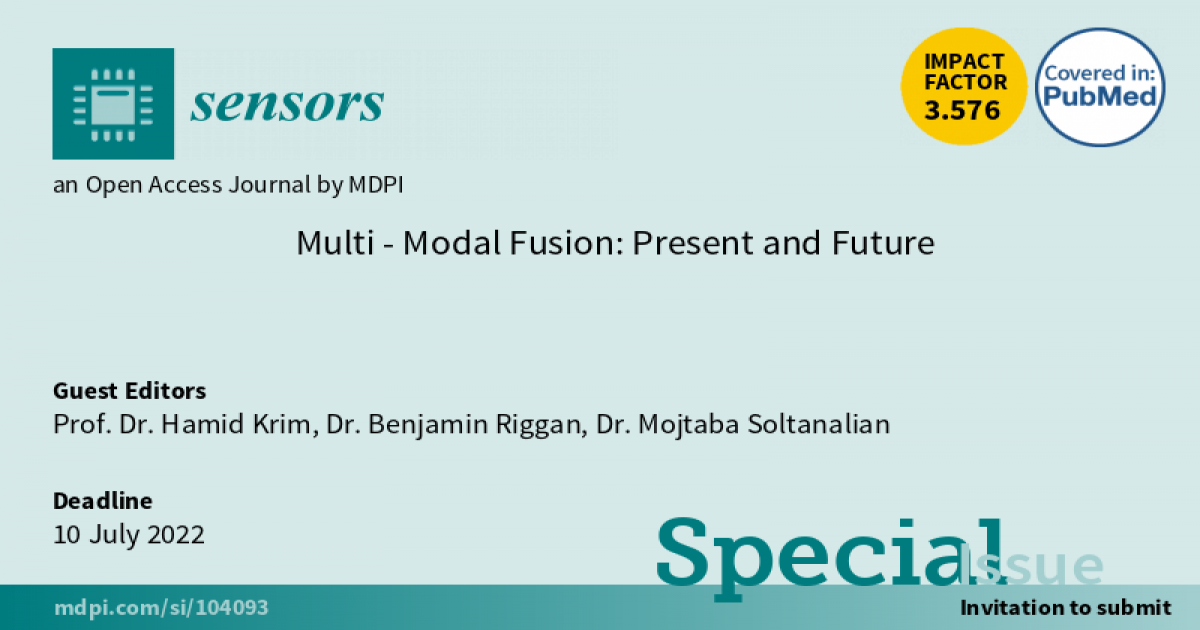Multi-Modal Fusion: Present and Future
A special issue of Sensors (ISSN 1424-8220). This special issue belongs to the section "Intelligent Sensors".
Deadline for manuscript submissions: closed (10 July 2022) | Viewed by 349

Special Issue Editors
Interests: estimation; signal processing; statistical signal and image analysis; machine learning
Interests: image & signal processing; computer vision; machine learning; biometrics
Special Issue Information
Dear Colleagues,
Sensor–information fusion, with its long and lasting interest, is re-emerging with critical importance across various disciplines and applications, largely due to the ubiquity of low-cost sensors and computational power commensurate with new fusion demands. The increasingly sophisticated applications invariably call on multi-modal sensing, thereby raising the theoretical, algorithmic, and computational challenges. Innovative and creative techniques have gradually become the norm. Therefore, this Special Issue not only aims to update the state of the art in multi-modal fusion and associated theories and methodologies but at also to pave the path forward for future research.
Machine Learning has, for example, shed some light on the science of analyzing and exploiting data, with new theoretical understanding incrementally emerging to further enrich principles relating to multi-modal fusion.
This Special Issue is expected to broadly address multi-modal fusion, including the heterogeneity of the data, the sensor deployment topology and site, and the science of analysis of the data and its exploitation. Innovation and creative solutions may hence lie at all levels.
Topics of interest in this Special Issue include (but are not limited to):
- Statistical foundations of multi-modal fusion;
- Theory of machine learning for multi-modal fusion;
- Novel architectures and methodologies for deep learning-based fusion;
- Guaranteed and reliable multi-modal fusion frameworks;
- Multi-modal sensor network design and optimization;
- Exploration of new data types that are typically overlooked in inference;
- Fusion of human data and data from physical sensors;
- Emerging applications of multi-modal fusion, including camera/radar/lidar data fusion for autonomous driving, data-efficient recommendation systems, human behavior understanding and human–computer interaction, and modern audiovisual learning platforms.
Prof. Dr. Hamid Krim
Dr. Benjamin Riggan
Dr. Mojtaba Soltanalian
Guest Editors
If you have any questions or need further information, please free to contact Special Issue Editor Larissa Zhang <larissa.zhang@mdpi.com>.
Manuscript Submission Information
Manuscripts should be submitted online at www.mdpi.com by registering and logging in to this website. Once you are registered, click here to go to the submission form. Manuscripts can be submitted until the deadline. All submissions that pass pre-check are peer-reviewed. Accepted papers will be published continuously in the journal (as soon as accepted) and will be listed together on the special issue website. Research articles, review articles as well as short communications are invited. For planned papers, a title and short abstract (about 100 words) can be sent to the Editorial Office for announcement on this website.
Submitted manuscripts should not have been published previously, nor be under consideration for publication elsewhere (except conference proceedings papers). All manuscripts are thoroughly refereed through a single-blind peer-review process. A guide for authors and other relevant information for submission of manuscripts is available on the Instructions for Authors page. Sensors is an international peer-reviewed open access semimonthly journal published by MDPI.
Please visit the Instructions for Authors page before submitting a manuscript. The Article Processing Charge (APC) for publication in this open access journal is 2600 CHF (Swiss Francs). Submitted papers should be well formatted and use good English. Authors may use MDPI's English editing service prior to publication or during author revisions.
Benefits of Publishing in a Special Issue
- Ease of navigation: Grouping papers by topic helps scholars navigate broad scope journals more efficiently.
- Greater discoverability: Special Issues support the reach and impact of scientific research. Articles in Special Issues are more discoverable and cited more frequently.
- Expansion of research network: Special Issues facilitate connections among authors, fostering scientific collaborations.
- External promotion: Articles in Special Issues are often promoted through the journal's social media, increasing their visibility.
- Reprint: MDPI Books provides the opportunity to republish successful Special Issues in book format, both online and in print.
Further information on MDPI's Special Issue policies can be found here.






